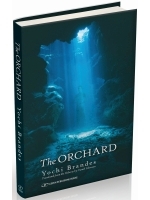When I was offered a review copy of the English translation of Yochi Brandes's The Orchard, which is her fictionalized version of the life and contributions to Judaism of the revered Rabbi Akiva, I wasn't sure if I should accept it.
From what I could gather, Brandes's approach to Judaism isn't what I call "mainstream," aka Orthodox. Her degree is from Machon Schechter, which is the Israeli academic institute of Conservative Judaism in Jerusalem. Her teaching of Bible and Judaism has been in Conservative and Reform schools and institutes. It's also important to note that the book is marketed as fiction, not history nor theology. That's why I decided to read The Orchard. It provides a "maybe this is what happened."
I'm not at all an expert in that period of time, the Sanhedrin and Rabbi Akiva. But since I've annoyed my neighbors over the years, when we learn about Lag B'Omer, the Period of Sefira and the Plague which killed thousands of Rabbi Akiva's students, because of my unconventional opinions, I hoped that Brandes's book would cast light. Ironically, that very famous story about Rabbi Akiva doesn't make it into Brandes's novel. Nor does the story of Rachel's coming to visit her husband and then turning back after seeing how joyfully he learned and taught.
Instead we see the very human side of the sages of the time and the political and personal intrigues. How much is true or fantasy? We will never know. I've been studying Bible for years, and I'm used to the idea that Judaism and the Jewish People were founded by humans with frailties. I don't feel threatened by the possibility, not at all.
The Orchard is written in first person as if Akiva's wife Rachel is speaking. This makes sense, since even the most conventional and fawning stories of Rabbi Akiva show her as the main character, the power behind the scene. Before I go any further, I must say that the translation by Daniel Libenson is fantastic. I have no idea how the book flows in Hebrew, but I was very impressed by Libenson's writing.
I definitely enjoyed reading The Orchard and recommend it. It's a fictionalized account of the times of Rabbi Akiva and Bar Kochba after Jerusalem was conquered by the Romans. My guess is that it's probably more realistic than the saccharine fairytale stories many other publishers offer. That's my opinion. You may agree or disagree. I suggest reading The Orchard before voicing yours.
From what I could gather, Brandes's approach to Judaism isn't what I call "mainstream," aka Orthodox. Her degree is from Machon Schechter, which is the Israeli academic institute of Conservative Judaism in Jerusalem. Her teaching of Bible and Judaism has been in Conservative and Reform schools and institutes. It's also important to note that the book is marketed as fiction, not history nor theology. That's why I decided to read The Orchard. It provides a "maybe this is what happened."
I'm not at all an expert in that period of time, the Sanhedrin and Rabbi Akiva. But since I've annoyed my neighbors over the years, when we learn about Lag B'Omer, the Period of Sefira and the Plague which killed thousands of Rabbi Akiva's students, because of my unconventional opinions, I hoped that Brandes's book would cast light. Ironically, that very famous story about Rabbi Akiva doesn't make it into Brandes's novel. Nor does the story of Rachel's coming to visit her husband and then turning back after seeing how joyfully he learned and taught.
Instead we see the very human side of the sages of the time and the political and personal intrigues. How much is true or fantasy? We will never know. I've been studying Bible for years, and I'm used to the idea that Judaism and the Jewish People were founded by humans with frailties. I don't feel threatened by the possibility, not at all.
The Orchard is written in first person as if Akiva's wife Rachel is speaking. This makes sense, since even the most conventional and fawning stories of Rabbi Akiva show her as the main character, the power behind the scene. Before I go any further, I must say that the translation by Daniel Libenson is fantastic. I have no idea how the book flows in Hebrew, but I was very impressed by Libenson's writing.
I definitely enjoyed reading The Orchard and recommend it. It's a fictionalized account of the times of Rabbi Akiva and Bar Kochba after Jerusalem was conquered by the Romans. My guess is that it's probably more realistic than the saccharine fairytale stories many other publishers offer. That's my opinion. You may agree or disagree. I suggest reading The Orchard before voicing yours.
The Orchard
Hapardes Shel Akiva in English
Authors: Yochi Brandes
Daniel Libenson (translator from Hebrew)
Publisher: Gefen Publishing House
Format: Paperback
ISBN 10: 9652299308
ISBN 13: 9789652299307
Catalog Number: 930-7
Number of Pages: 392
Year Published: 2017
Authors: Yochi Brandes
Daniel Libenson (translator from Hebrew)
Publisher: Gefen Publishing House
Format: Paperback
ISBN 10: 9652299308
ISBN 13: 9789652299307
Catalog Number: 930-7
Number of Pages: 392
Year Published: 2017
